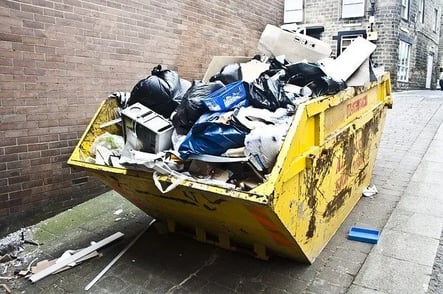Waste Management In The Construction Industry: The facts
The UK generates approximately 220million tonnes of waste per year. Construction, demolition and excavation is responsible for 59% of that number. Of that construction waste, around 25million tonnes ends up in landfill each year. They are some pretty shocking and hard-hitting statistics to get us thinking about how not to get wasted!
The True Cost Of Waste

Millions of pounds are wasted in the construction industry each year from poor waste management. But where do these tens of millions of tonnes of waste come from? Construction waste can be contaminated ground, damaged materials, off-cuts, leftovers (concrete, plaster, paints, solvents), in fact anything not used and intended to be discarded. All this waste costs money and this is not just the cost of hiring a skip. The true cost of waste includes:
- the cost of materials that end up as waste
- the labour cost to handle waste on site
- the cost of waste storage
- waste transportation costs
- treatment of waste costs
- Disposal of waste which could include landfill tax
The true cost of waste is about 10 times the cost of hiring a skip. Landfill tax has seen substantial increases over recent years. 8 years ago it was £48 per tonne but in April 2019 has just tipped the £90 mark, increasing to £91.35 per tonne!
Why Do We Need To Minimise Waste?
Waste is a huge producer of CO² and the construction industry contributes to a huge proportion of this. The government’s Climate Change Act has vowed to reduce emissions by 80% by 2050 (set again 1990 base levels) and the construction industry must play a part if we are to meet this. Minimising waste also
- Has positive effects on the environment
- Prevents overfilling of landfill
- Reduces costs from purchasing less material and maximising skip space
- Complies with legislation
- Reduces accidents by storing materials carefully
- Helps conserve natural materials
How Can We Manage Waste?

Though Site Waste Management Plans (SWMP) are no longer compulsory, many sites continue to use them. SWMPs were introduced in 2008 as compulsory for construction projects costing over £30,000. The plans made a record of the volume of waste on site and documented how it is disposed of, recycled or reused. The two massive benefits of SWMPs of caring for the environment as well as looking after the bottom line through improved cost savings from waste management has meant many companies have continued to use these plans. Designing for deconstruction is also a growing school of thought that rejects the old cartoon Tom and Jerry dynamite demolition of building in favour of eco-friendly demolition plans. The idea behind this includes careful consideration of materials used and plans for recycling them and avoiding materials that create huge amounts of waste. A common issue that affects construction sites is categorising what constitutes as hazardous waste. It is a legal requirement that waste must be separated and mixing hazardous and non-hazardous waste can prevent recycling and is more costly with possible penalties being incurred. Waste can be classed as inert (eg. Bricks, glass), hazardous (e.g. paint tins, mastic tubes) or non-hazardous (e.g. packaging, plasterboard). In most cases the waste code on the product will inform you if it is hazardous or not (it will have an asterisk beside it if it’s hazardous) or it will be clearly labelled with black and orange colours and danger symbols. If you produce 500kg of hazardous waste per year, your premises must be registered with the government to avoid falling into legal trouble. It can be a good idea to outsource your waste collection to registered companies which simplifies the process for you, provides you with the legal documentation required and ensures waste is disposed of in the most environmentally-responsible way. All businesses have a duty of care to ensure the waste they produce is handled safely and within the law so always check that any company removing your waste is a registered waste carrier and waste is taken to a registered management site.
The 4 Rs
Always consider the 4 Rs when it comes to waste; Reduce, Reuse, Recycle, Recover. The first step is always to Reduce your waste by avoiding producing waste in the first place by:
- Avoiding impulsive buys
- Ordering to specifics meaning less waste off-cuts
- Avoiding over-ordering
- Ensuring material storage is safe and weather-proof to prevent damage and therefore waste
- Minimising rework from errors or poor workmanship
- Not removing protective packaging until you’re ready to use
- Never accepting poor quality or damaged deliveries
- Do not open a new pack/box until another is finished
Reuse items as many times as possible (where safe and appropriate to do so). Collect off-cuts and use those first, share left-over materials with others that it may be useful for, return, sell or donate salvaged materials and repair items.
Recycle as much as you can. Ensure you sort into correct waste categories and clearly signpost each one and keep materials for recycling clean and dry. The government’s Resources and Waste Strategy has been welcomed by the recycling sector. Though ambitious and radical these plans will significantly help improve the recycling rates which have flatlined or decreased in some areas over the last few years. Plans include businesses and manufacturers paying the full cost of recycling or disposing of packaging waste, shoppers being charged an up-front cost when buying drinks in single-use containers, it will be easier to know what you can recycle and schemes will be more consistent from council to council.
The final step to managing your waste is to recover; send what cannot be recycled for energy recovery.
Case study
Bristol Based company HelmCom sets a great example when it comes to waste management in construction. This small developer encourages staff to use materials more efficiently and manage waste in a sustainable way. The company shares the savings it makes. On one house conversion project the five staff received an average bonus of £287 each. This has benefited not only the environment and it’s staff but also the company by contributing to high staff retention.

